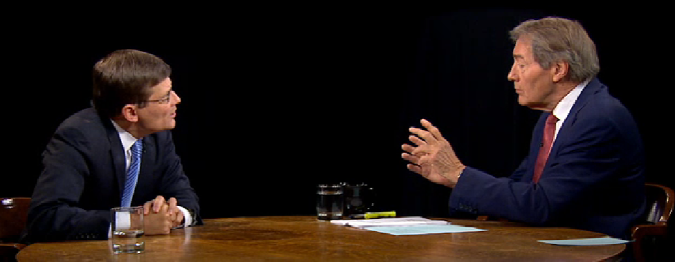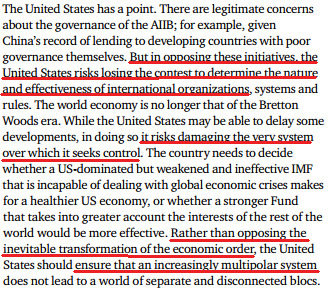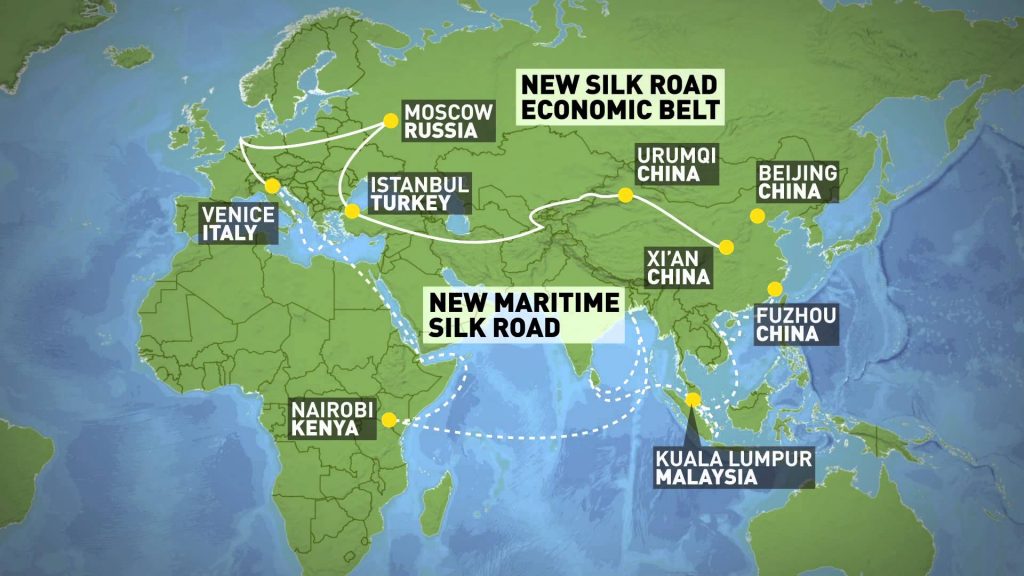CIA Breaks Its Silence On “New Silk Road”: Says Challenging The BRICS And AIIB Was A “Mistake”
by Rusticus
For the geopolitically alert audience, there’s little worthwhile on television these days (assuming there ever was); but for those willing to wade through the Matrix Box’s flashing imagery of disinformation, entrainment technology, and trash TV, a select few programs contain the occasional glimmer of Deep Political lucidity from a typically tight-lipped “ruling class.”
One such show is MSNBC’s Morning Joe, due in no small part to co-host Mika Brzezinski’s segment that I’ve come to lovingly refer to as Conversations with Daddy Zbigniew. Another long-running example, the “prestigious” PBS program hosted by Bilderberger and Trilateral Commission member Charlie Rose, provides unparalleled access in this regard – that is, when he’s not busy passing off celebrity interviews as “cultured” and “sophisticated” or even “newsworthy.”
But when Charlie’s immense access (from Rockefellers to Rothschilds) is put to the test, there is no better glimpse for the public into the world of geopolitik and its “Grand Chessboard.” At least, not on TV! One such conversation took place earlier this week and has already gotten its fair share of coverage in the blogosphere – an interview with former deputy director of the CIA, Mike Morell:
Morell has ostensibly “left” the agency after 33 years of so-called “service” for the express intent ofpublicly endorsing Hillary Clinton for President, which he did by publishing a gushing ovation inThe New York Times. Among his laundry list of reasons for endorsement, Morell emphatically declares that a Clinton regime would be more willing to “kill Russians” and “kill Iranians,”would be more apt to escalate war in Syria, and would doubtlessly be more likely to (as Charlie Rose puts it) “arm the Mujahidden.”
Which of course, has never been done before in history to catastrophic ends. Ever.
Morell also suggests over the course of the interview (as well as his Times op-ed) that Donald Trump is an unwitting Russian agent – a claim that many will find ridiculous yet, nevertheless, has been somewhat substantiated by none other than veteran 9/11 sleuth and drug trade researcher, Dan Hopsicker.
And all this within the first half of the interview! We owe it all to the intimate setting of the round (oak) table, truly.
The latter portion of this illuminating dialogue, unfortunately, received far less play; it was at this point that the conversation shifted from domestic politics and Middle Eastern wars of imperialism towards the rise of China. Speaking “strictly for himself,” the former DD/CIA offered his opinions on potential conflict with China – and perhaps more importantly, the shared interests of a rising China and the Anglo-American Establishment in a multilateral World Order.
But hey, you know what they say about quitting the Agency: You never really do.
 The One Belt, One Eurasian Encirclement Project
The One Belt, One Eurasian Encirclement Project
The most important bilateral relationship for the future of Eastasia, for the future of the world, is the relationship between Washington and Beijing. That’s a strong statement, but I believe it to be true.
This author has long documented the merging (and in part, managed destruction) of the “old unipolar Order of the West” in favor of the “new multipolar Order of the East;” a thesis not built upon some personal stroke of brilliance or super-secret “insider” information, but rather the ruminations of Globalist organizations themselves on these matters, which are openly released to the public in the form of policy papers. The list of institutions proclaiming a desire for an Eastern-led economic and geopolitical “multipolar New World Order” is staggering, and the names on that list should not be strangers to even the casual Deep Political researcher:
- Chatham House (the British outpost of the CFR)
- The Bank for International Settlements
- The United Nations Council on Trade and Development
- The People’s Bank of China
- The International Monetary Fund and its SDR Basket
- The World Bank and AIIB via “Development Pacts”
- The BRICS Bank
- The Kremlin
- …and even Goldman Sachs
 The CIA, too, now count themselves among these ranks, after distinctly missing the “multipolar” memo last year when the Obama administration vocally opposed the UK’s early entry into the AIIB. Not to be caught playing second-fiddle in the “Special Relationship,” Morell took the opportunity on his tell-a-vision appearance to bring his (and by some measure of extension, the Agency’s) views in line with those expressed by Chatham House in its latest policy paper on “international economic governance” when he said:
The CIA, too, now count themselves among these ranks, after distinctly missing the “multipolar” memo last year when the Obama administration vocally opposed the UK’s early entry into the AIIB. Not to be caught playing second-fiddle in the “Special Relationship,” Morell took the opportunity on his tell-a-vision appearance to bring his (and by some measure of extension, the Agency’s) views in line with those expressed by Chatham House in its latest policy paper on “international economic governance” when he said:
We will give China more room to exercise influence if they play by the rules of the International Order. What does that mean? It means that, for example, I think it was a mistake for the United States of America to push back when China wanted to create a regional development bank. The Brits broke rank with us immediately. So you don’t push back on stuff like that where they’re actually trying to play by the rules.
-Mike Morell on Charlie Rose
So according to the Deputy Director of the CIA itself, the Eastern development bank(s) are not a threat to the “International Order.” On the contrary, they are China’s outward attempt to “play by the rules,” as Mr. Morell puts it, and are rapidly integrating themselves into veteran institutions of the “rules based international order” like the IMF and World Bank.
Comparing Morell’s above statement with the policy prescriptions of Chatham House, one can clearly see a concerted effort that spans multiple institutions towards paving the way for an Eastern-centric World Order:
 From Chatham House publication, “International Economic Governance: Last Chance for the G20?”
From Chatham House publication, “International Economic Governance: Last Chance for the G20?”
Bear in mind that the most widely publicized infrastructure project of the BRICS and AIIB is the New Silk Road (or “One Belt, One Road” project as it’s called in China) – a planned trade and travel land route spanning vast swaths of the Eurasian rimland. There’s a specific reason Western intelligence agencies would be keen on giving their blessing to such a “New Silk Road,” but we’ll come to that soon enough.
It wasn’t long ago that the Charlie Rose program broadcast an interview with another consummate insider, Henry Kissinger, discussing the place of China in a “New World Order” (Mr. Kissinger’s words). Elaborating on this point later, Kissinger lamented that while China valued the “superiority and uniqueness” of their culture, he thought it “hard to imagine Chinese armies invading somewhere to make Chinese culture, Chinese governing principles. That is not a Chinese way of thinking.”
“It’s hard for me to imagine a Chinese military strategy backed up by a Chinese world government, even in the name of universal peace,” he noted in a lecture to the Center for Strategic International Studies.
In Mike Morell’s recent Charlie Rose appearance, though, the former CIA agent seems to refute Kissinger’s notion of China’s cultural and historic lack of overt imperialism; as Morell states in no uncertain terms, the use of military force to protect overlapping “national security interests” is actively being marketed to the Chinese government, and not without success:
Morell: I base this on my own conversations with Chinese officials, my counterparts in China. I believe that there are a growing number of places in the world where our national security interests overlap than where they are in conflict. I believe there’s potential for us to cooperate and work together.
Rose: Do the Chinese believe that and do they want to do that?
Morell: Yes. Yes, I think they believe it and they’re increasingly coming to understand that it is in their best interest.
On these two fronts, the economic expansion of the twin Asian development banks as well as joint “national security” (read: Empire-building) interests, American Intelligence sees room for cooperation. Morell was, however, quick to clarify: Chinese expansion into the South China Sea is not a “shared national security interest,” but a point of tension, particularly as the Anglo-American Establishment has set forth in its “Island Chain” policy of Chinese containment (for more on this topic, listen to this Council on Foreign Relations podcast).
While China’s blue-water expansion is disallowed in the eyes of Morell and the CIA, there is far more room for overlapping “national security interests” on land – particularly on such a lengthy route as the one proposed by the New Silk Road. And perhaps not coincidentally, the “One Belt, One Road” project just so happens to be situated along a region long considered the linchpin for global dominance: The Eurasian Heartland.
Who rules East Europe commands the Heartland;
Who rules the Heartland commands the World-Island;
Who rules the World-Island commands the World.-Sir John Mackinder, Democratic Ideals and Reality
While the term “Heartland” was coined by John Mackinder during the original “Great Game” between Czarist Russia and the British Empire during the 19th Century, it is generally understood today to describe Eastern Europe, Russia, and the Central-Asian Caucus states. The British Empire of antiquity postulated that direct control and invasion of the Heartland was the key to victory; modern schemers for the cause of World Federalism like Zbigniew Brzezinski, however, hold that the encirclement of the Heartland is the true path to world domination.
Brzezinski refined Mackinder’s original “Heartland” idea in his 1997 book, The Grand Chessboard,referring to the region as the Eurasian Balkans:
The Eurasian Balkans, astride the inevitably emerging transportation network meant to link more directly Eurasia’s richest and most industrious western and eastern extremities, are also geopolitically significant.
Moreover, they are of importance from the standpoint of security and historical ambitions to at least three of their most immediate and more powerful neighbors, namely, Russia, Turkey, and Iran, with China also signaling an increasing political interest in the region.
But the Eurasian Balkans are infinitely more important as a potential economic prize: an enormous concentration of natural gas and oil reserves is located in the region, in addition to important minerals, including gold.
-Zbigniew Brzezinski, The Grand Chessboard
With nearly twenty years of retrospection, it’s clear to see that the “inevitably emerging transportation network” designed to link the “most industrious western and eastern extremities” has indeed begun development in the form of the “New Silk Road.”
And where, exactly, is this “One Belt, One Road” to occupy? The Eurasian Balkans.
This is a map of the Eurasian Heartland as originally conceived by John Mackinder:
 …and here is a map of the proposed New Silk Road land route:
…and here is a map of the proposed New Silk Road land route:
 Quite literally “Heartland Encirclement by another means” as the (not so) Great Game continues unabated. While it’s yet to be seen whether or not Chinese expansion into the Central-Asian Caucasus will coincide with Anglo-American aspirations of global governance, Mike Morell and his “Chinese counterparts” in intelligence are right about one thing: The New Silk Road is ripe for shared “national security interests” between West and East.
Quite literally “Heartland Encirclement by another means” as the (not so) Great Game continues unabated. While it’s yet to be seen whether or not Chinese expansion into the Central-Asian Caucasus will coincide with Anglo-American aspirations of global governance, Mike Morell and his “Chinese counterparts” in intelligence are right about one thing: The New Silk Road is ripe for shared “national security interests” between West and East.
Isolation of Russia. Vast gold reserves. Key natural gas and oil transit lines. “Sustainable Development” (Agenda 21) infrastructure. The resurgence of Golden Triangle opium.
Can the “old World Order” ruling caste sell the “new kids on the trading block” on shared interests in one or more of these areas? Can a long-dead imperial fervor within Southeast Asia’s majority Han population be revived, as it was in the Han Dynasty of olde, for the aim of expanding Globalism?
We seem to be well along the path of this “One Road,” Reader – yet thanks in part to the prognostications of CIA officials, one cannot say we were not warned!
